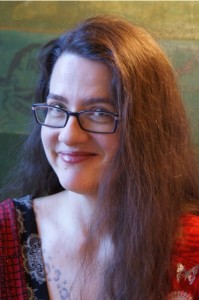
Author Stephanie Burgis
Stephanie Burgis grew up in East Lansing, Michigan but now lives in Wales, surrounded by castles and coffeeshops. She is the author of two historical fantasy novels for adults, Masks and Shadows and Congress of Secrets
and Congress of Secrets , both published by Pyr Books. She’s also the author of over thirty short f/sf stories and a trilogy of Regency fantasy novels for younger readers, beginning with Kat, Incorrigible
, both published by Pyr Books. She’s also the author of over thirty short f/sf stories and a trilogy of Regency fantasy novels for younger readers, beginning with Kat, Incorrigible . To find out more and read excerpts from all of her books, please visit her website: www.stephanieburgis.com.
. To find out more and read excerpts from all of her books, please visit her website: www.stephanieburgis.com.
Is there a literary heroine on whom you imprinted as a child? A first love, a person you wanted to become as an adult, a heroic girl or woman you pretended to be on the playground at recess?
I imprinted SO HARD on so many literary heroines as a kid! It’s actually hard to narrow it down – Anne of Green Gables ! Jane Eyre
! Jane Eyre ! Elizabeth Bennet! Meg Murry! I loved them all – but: when it comes down to it, I identified with Jo March (from Little Women
! Elizabeth Bennet! Meg Murry! I loved them all – but: when it comes down to it, I identified with Jo March (from Little Women ) in SO many ways.
) in SO many ways.
Can you remember what it was she did or what qualities she had that captured your affections and your imagination so strongly?
She was a writer! (Which I already knew I wanted to be, from the time I was seen.) And she was fiercely ambitious with her writing from very early on in her childhood. In the book, she and her sisters even wrote a magazine as kids where she self-published her own stories – and as a kid, I actually did the same, circulating it ONLY among my own family members! Jo loved acting in plays that she’d written, she was wildly romantic, but she was also socially awkward and frequently messed up in important social situations when she most needed to do her best. She dreamed of traveling in Europe, just like I did; she was devoted to her family and she fought fiercely with them too. She felt real to me and she was wonderful.
How does she compare to the female characters in your work? Is she their literary ancestor? Do they rebel against all she stands for? What might your creations owe her?
My MG heroines probably have more in common with her than most of my adult-fic heroines, but there are definite commonalities throughout. I love writing fiercely ambitious and determined heroines (of any age), in the same way that I’ve always imprinted on them as a reader.
In my new historical fantasy novel, Congress of Secrets, I set out to take the trope of the powerful, manipulative, woman who’s often portrayed as a villainess and make her the heroine of the story instead. Caroline, my heroine, has been planning her scheme for years, and now that she’s finally back in Vienna under the guise of a new identity (using the 1814 Congress of Vienna as her excuse for the trip), she’s ready to do whatever it takes to accomplish it…even if she has to resort to the same kind of dark alchemy that ruined her childhood.


However, while she is ruthless in her determination, she’s not unfeeling; like Jo, she’s actually devoted to her family, and her whole scheme is based around trying to save her father from unjust imprisonment. So, while she and Jo March might not have many surface similarities, a few of the essential qualities are the same.
About this post: The Heroine Question is my name for a series of short interviews with (mostly) female writers about their favorite characters and literary influences. Clicking the link will allow you to browse all the other interviews, with awesome people like Linda Nagata, Kay Kenyon, and S.B. Divya. If you prefer something more in the way of an actual index, it’s here.
 Early this year I reviewed a Patricia McKillip novel, Kingfisher
Early this year I reviewed a Patricia McKillip novel, Kingfisher, a contemporary other-world fantasy with kings, knights, princesses, jousting, water-priestesses… and also social media, foodie culture, and cell phones.









